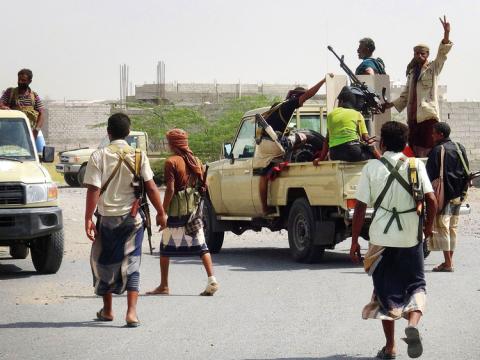Yemen’s Deadly Seas: Fishermen Come Under Fire in Saudi War.


The first sign of trouble was the helicopter that hovered over the small Yemeni fishing trawler as it cut across the Red Sea. Then a warship appeared, its guns pointed at the boat.
Bullets thumped into the water around the boat, the Afaq, then rippled through its flimsy wooden hull. One fishermen was shot in the eye, another in the head. The engine caught fire. Crew members leapt overboard, including Bashar Qasim, 11.
Moments earlier, the boy had been hauling nets from the stern. Now, he paddled for his life amid the flaming debris and floating corpses, with survivors clinging to empty water drums. As the Afaq sank, he said, the warship stopped firing.
“It circled several times, watching us, to make sure the boat had sunk,” Bashar said. “Then it was gone.”
The stinging criticism of Saudi Arabia’s role in Yemen’s grinding conflict has, for the most part, focused on the air war. Fighter jets with the Saudi-led coalition, armed with American weapons and bombs, have hit weddings, funerals and a school bus. Thousands of civilians have died.
The fish market in Khokha. The six fishing boats that were attacked departed from the port here, which is controlled by the Saudi-led coalition.
As outrage over the murder of the Saudi dissident Jamal Khashoggi in Istanbul by Saudi operatives fused with concern about Yemen, a wave of disquiet swept Washington amid accusations that the United States military could be complicit in war crimes. Last week, the Senate voted to end American military assistance for the Saudi-led war, in a symbolic yet stinging rebuke to President Trump, who has stood by Saudi Arabia.
But the Yemen war is also unfolding at sea, with even less accountability than on land. There, too, civilians are dying in droves.
The Afaq was one of at least six Yemeni fishing boats hit by warships, helicopters and a fighter jet after leaving the coalition-controlled port of Khokha in the southern Red Sea over six weeks in August and September.
Identifying the perpetrators of maritime attacks is notoriously difficult, especially in a war as chaotic and opaque as the one in Yemen. Both the Saudi-led coalition and its Houthi foes, who are backed by Iran, have carried out attacks at sea.
But maritime experts, a former United States Navy officer, United Nations investigators and several Yemeni officials said there was little doubt that the Saudi-led coalition was responsible for some if not all of the violence against fishermen.
Saudi and Emirati naval boats dominate the Red Sea waters where the shootings and bombings took place. Five involved attack helicopters, which the Houthis do not have. In one instance, Saudi officials made cash payments of nearly $500,000 to the families of fishermen killed in an attack.
In another, coalition sailors detained 12 survivors and held them for three months in a Saudi prison, where the fishermen said they were interrogated and tortured. Eight of those detainees were recently released after receiving a payment of $1,300 each from their Saudi captors.
“A soldier posed with us in the prison for a photo and said, ‘Sorry if we hurt you,’” Yaqoub Okad, 20, said in an interview after his return to Yemen.
In a statement issued via the embassy of Saudi Arabia in Washington, a coalition spokesman, Col. Turki al-Malki, confirmed that a coalition vessel had opened fire on that boat, the Ansar, and captured 12 fishermen. He said the boat’s crew had ignored warnings from a warship accompanying a Saudi oil tanker through the Red Sea. Three of the fishermen turned out to be “armed Houthi terrorists,” he said.
Colonel Malki declined to answer questions about the other five attacks between Aug. 1 and Sept. 15, which he said had been referred to the coalition’s internal investigations body.
AFP.

Paris — The French humanitarian organization Acted announced that it has delivered cash assistance to nearly 89,000 people affected by displa…

Sana’a — Fuel and food imports into ports under the control of Yemen’s Houthi movement on the Red Sea have continued to fall for…

ADEN — Yemen Airways, the country’s national carrier, announced it will resume flights between Aden and Abu Dhabi beginning in January…